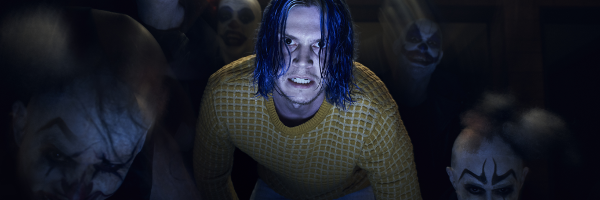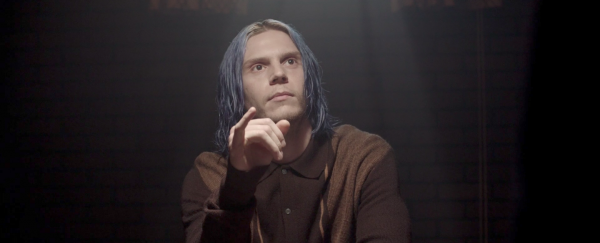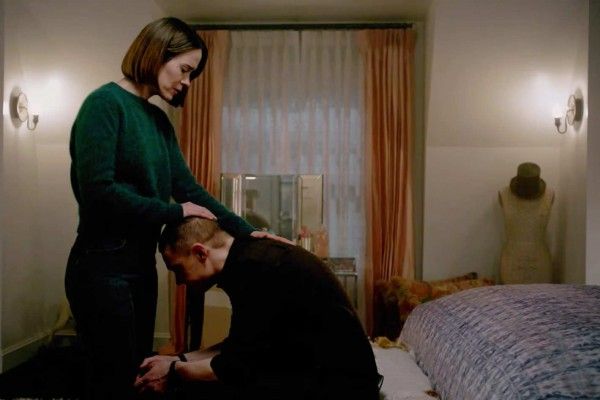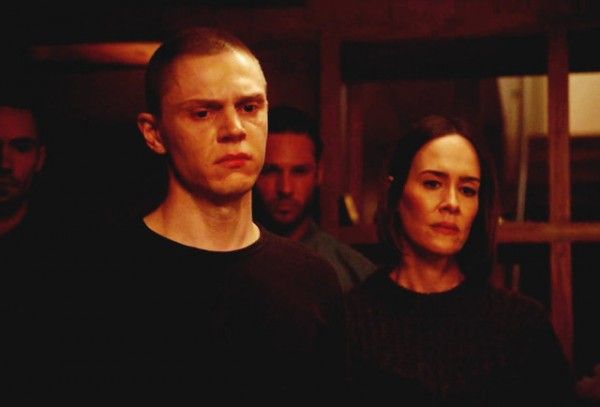If you're looking for grand theatrics, plot twists, and dark humor, you can always count on an American Horror Story finale to deliver a spectacle unlike any other. But in its seventh season, the series also took on the weight of the topical terrors of post-Trump America, making for an unconventional season and an equally unusual finale that swapped buckets of blood for a political punch. Indeed, Cult cast off many of the traditional AHS trappings in favor of something stranger this season, leaving behind supernatural scares in favor of horrors rooted in the real world -- phobias, clown, killers, killer clowns, and yes, cults. Cults of all shapes and sizes, that dominate the discourse in times of rampant fear, when people are just looking for an ideology to cling to.
In American Horror Story: Cult, we glimpsed plenty of toxic ideologies; from Helter Skelter, to Jonestown, to the goofy grandiosity of Andy Warhol, and (when Cult is at its best) the two-party panic that dominates today's cultural climate. In the season's early episodes, Cult rattled a raw nerve, picking at the festering anxiety, unease, and plain old fear that has settled across America in this deeply divisive time. With killer clowns and mysterious green fog, Cult conjured the all-too-real feeling of living in a world turned upside down, where no one's on your side, not even the people you love most. It was also funny, especially anything involving Billy Eichner and Leslie Grossman, who emerged as an early series highlight duo before meeting their untimely ends mid-season. (Side Note -- Honestly, why would anybody join Kai's cult? He literally kills everyone. It's the worst cult.)
Unfortunately, Cult follows AHS tradition in one key way; it completely unravels in the middle, abandoning threads or abruptly chopping them off, and abandoning the powerful fear of now for the cults born of panics past. Sure it's deliciously irreverent and self-indulgent and so classically AHS to devote an episode to Lena Dunham as Valerie Solanas, but ultimately it's a diversion. And as the episodes reveled more and more in the Evan Peters As Every Famous Cult Leader stunt, the season quickly deflated and got trapped in its own narrative bog. It also did some real weird incesty stuff, but you do you American Horror Story. You do you. So did Cult manage to pull it together in the end and recapture the energy of its best moments? Well, no. Let's dive into the finale.
In an unnecessary bit of convoluted structure, The finale begins with Kai in prison, where he has launched a new incarnation of his cult among the inmates, before doubling back to explain how he ended up there in the first place. Finally we get an answer to why the ever-loving heck Ally would ever sign up to be a member of Kai's cult; the FBI, of course. When Ally was institutionalized after Kai's assassination attempt, the FBI recruited her about to infiltrate the cult, serve as their mole, and bring the blue-haired madman down. Ally accepted under the condition that she would get immunity, which is why she gets away with killing Ivy and Speedwagon scot-free. As we learned in the last episode, Speedwagon was spying on Kai for the cops after getting roped into a scheme to bring down the crooked Detective Samuels, and Ally murdered him in cold blood, presumably so the local cops wouldn't mess up the FBI's take down.
In a delicious moment of revenge, Ally savors telling Kai about Speedwagon's duplicity, revealing that his sister Winter never betrayed him after all. He killed her for nothing. Peters does some spectacular acting in that moment, as he's done all season, drawing up palpable, manic grief and contorting his face in anguish. It's a quiet moment of payback, and Ally plays it cool, cradling Kai's head and acting like his pillar of strength. But Sarah Paulson is one of the best for a reason, and she lights up the scene with a subtle but decadent pleasure. Ally relishes in tormenting Kai right in his face. Paulson and Peters consistently elevate the material on American Horror Story and Cult has demanded their finest work yet. Watching them play off each other at full speed in these last few episodes has been a delight, even as the series started spinning off the rails.
Kai channels his rage and heartbreak into the Night of 100 Tates (turns out 1000 Tates was a little too ambitious), which would see Kai's alt-right army murder a hundred pregnant women in a horrific callback to the Manson murders in order to send womankind into a fit of unshakeable fear. You may remember Kai was recruited by his anger management counselor, Valerie Solanis protegee and SCUM militant Bebe Babbitt, to incite the anger of women and lead them to revolution. At a certain point, Kai transforms his agenda to your standard patriarchal male dominance schtick, and the Night of 100 Tates was meant to be his finishing move to put women back in the kitchen forever. Fortunately, the FBI come bursting in before Kai can unleash his legion of deadly dickheads on the world, though we do get a rather grisly demonstration via some watermelons, which are handed off to the women to make a nice feta salad, in one of the season's most on-brand moments of cheekiness. After an embarrassing defeat at the hands of a woman (gasp), the would-be "Divine Leader" is tossed into the clink, where he sprouts his misogynist cult once again. A few dead followers and a converted prison guard later, Kai is loose on the streets once more, setting the stage for a final confrontation with Ally.
See, while Kai was locked up, Ally was getting busy on transforming her life from one of fear to one of empowerment. Viewed as a celebrity survivor, Ally is living a life beyond the confines of her once-phobic dreams. Business is booming at the Butchery, Ally's got a gorgeous new girlfriend that's great with Oz (who Kai was furious to learn isn't his messiah baby, by the way), and she's using her newfound celebrity as a launching pad to secure the Senate seat Kai wanted so desperately. The people love her, but there's one problem. In a blunt Clinton parallel, they don't think she's strong enough. "Isn’t it sad when a strong woman scares people more than clowns?" Ally muses as she preps for a big debate. If she lands this debate, she lands the election. Beverly however, isn't thriving yet. She was on the brink of suicide before the FBI raid but Ally put her off her death wish just long enough to get out, and now that's she's free, she can't stop waiting for the other shoe to drop.
Ally heads into the debate in a big bold red pantsuit and gives as good as she gets at the podium until Kai bursts in, armed and unhinged, to dismantle her in front of the nation and bring women's hopes topping down with her. “You symbolize the hope that women will one day win an argument with their husbands,” he rages. “That they won’t be catcalled when they walk down the streets, that their bosses won’t talk about their tits anymore, that they’ll make just as much money as men make, that the fight is winnable. When I kill you, they’ll see that there is no hope.”
He pulls the trigger, but nothing happens. Ally smiles. Turns out that security guard was never in his pocket, she was in Ally's the whole time and the whole damn escape was a set-up to move Kai like a pawn, and strike him down at just the right moment to make Ally look unquestionably tough. “You were wrong," Ally tells him, "there is something more dangerous in this world than a humiliated man: a nasty woman.” And then Beverly blows his brains out. It's a hell of a punchline and perhaps the most on-the-nose gag in a series known for being on-the-nose. Ally wins the election in a landslide, earning a historic percentage of the female vote. As she tucks Oz in, she warns him to be a good man, better than those that came before him. He promises he will, but there's worry and maybe something a bit more sinister in the way she looks at him. She tells her son she's off to meet with some strong women who are going to change the world, and before she heads out, Ally tosses a green hood up over her head. SCUM strikes again. Cults win. The End.
Paulson explained to EW, "It’s the SCUM cloak. Listen, this is a conversation that Ryan and Tim Minear and I really had. At the end of the day, she’s the mother of a son. She has a boy she’s raising. There’s a kind of poignant moment where he says, 'Am I going to be a good person? Am I going to be a good man?' And I say, 'I hope so.' And their intent with writing it and my intent with playing it was, 'I hope you will because my mission in life now is to create a world where men have to be responsible for themselves and their behavior. I’m going to be in Washington and have some power, and the goal being nobody is going to get away with anything anymore. More than a good person, you have to be a feminist. You have to be on the right side of history.' It should have had a feeling of something odd in my communication to him."
Credit to the creative team on foresight, because Cult's finale comes a moment where female anger, hurt, and empowerment are coming into focus on an unprecedented level. With the steady drumbeat of Hollywood assault investigations, the hideous allegations about a senatorial candidate and underaged girls, and the shared strength of the Me Too movement, Women are speaking out en masse in ways we never have before, and the effects, like a dam unleashed, have been staggering. Powerful men aren't being slapped on the wrists and shielded by HR, they're losing their jobs. They're facing actual real-world consequences for their misdeeds, and in some cases, the possibility of legal action. And the voices keep coming, louder and louder, as each new story emboldens another woman to tell her tale. So yes, Cult's finale has certainly tapped into a livewire of public consciousness. Perhaps the natural expectation; an expansion on the women's marches that burst out on the streets after the election, but Cult's timing is certainly beyond reproach, and that blurring of the lines between our off-balance reality and Cult's outright insane world gives the season that sense of nauseous, percolating dread again, if just for a moment.
But the ending also raises some tough questions to untangle. Who was the hero of this piece? Ally, ostensibly, though she's a remarkably off-putting protagonist, transitioning on a dime from intolerably emotional to impenetrably callous. She's a murderer, and as her scheme with the prison guard revealed, a calculating manipulator even above Kai's level. Are we meant to believe, then, that they are two sides of the same coin? A cycle of cult-think where a new form of indoctrinated beliefs take the mantle every time a villain is defeated? Is the intent that women respond to cycles of oppression with their own forms of gendered violence? Perhaps the ending wasn't meant to be overthought, but rather enjoyed as a pulpy piece of entertainment, but when a show pokes at the brand new wounds of America's latest brand of chaos, there's added weight behind the typically escapist theatrics.
Or maybe this is just a super nasty, nihilistic piece of pop culture. And that's fitting really. For a time when the president throws kindergarten insults at world leaders on social media and flagrantly lies with staggering regularity, when everything is up for debate, truth is suspect, and there are "some very fine people both sides," maybe nasty is the operative word, and Cult's brand of surreal misanthropy will endure as a snapshot of a crass, cruel time in American discord.





